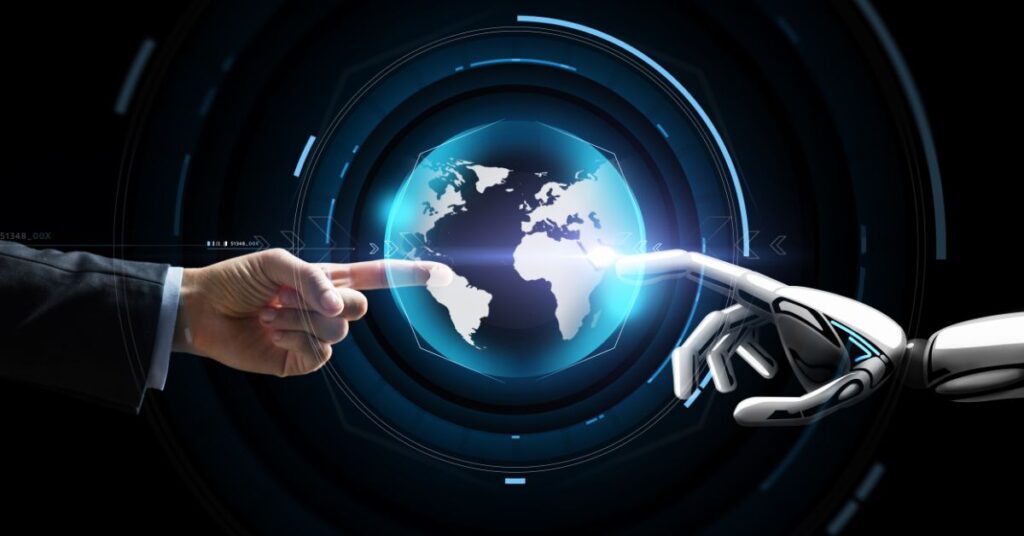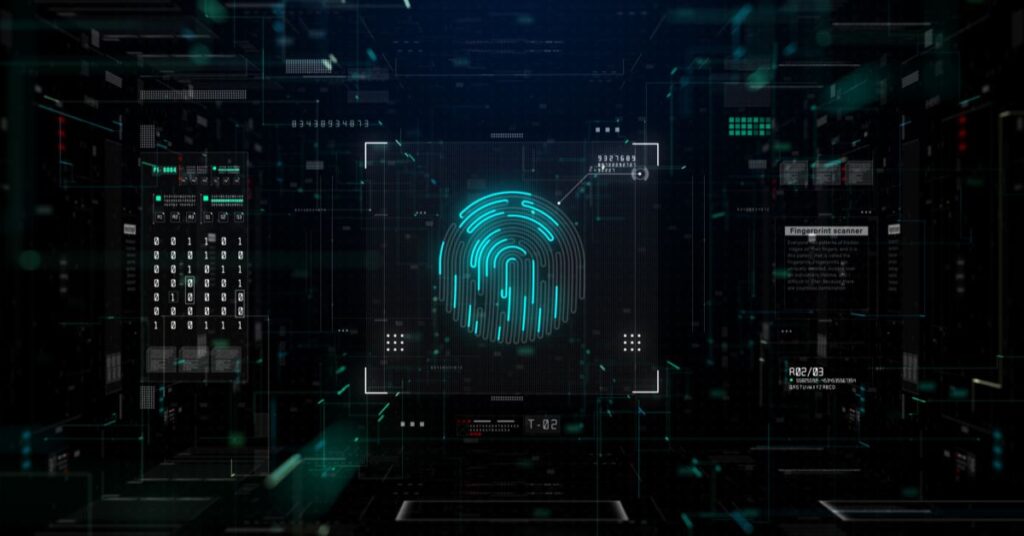Will Cybersecurity Be Replaced by AI? Much like any other industry, cybersecurity has been completely revolutionized by the introduction of artificial intelligence (AI).
Now the question arises: Can cybersecurity be fully replaced by AI as these technologies continue to evolve?
This article addresses this subject, exploring how AI is impacting cybersecurity, its constraints, and whether human intelligence may eventually become obsolete in this field.
AI and Cybersecurity

AI and Cybersecurity
Enhanced Threat Detection
The capacity to improve threat detection is perhaps one of the most striking benefits that AI has brought to cybersecurity.
Most classic security measures are based on predefined rules and signatures that determine whether a threat exists.
However, traditional methods of protection are often handicapped by cybercriminals who remain two steps ahead, continually finding new and creative ways to bypass these measures.
In contrast, artificial intelligence can sift through large amounts of data and detect patterns that may signify a threat, particularly when machine learning is used.
AI can recognize odd patterns in network traffic and suggest when something suspicious should be stopped before it becomes much worse.
This capability significantly reduces response times, enabling organizations to rapidly respond and defend against threats.
Detection of Malware and Finding Vulnerabilities
AI is particularly adept at recognizing malware and understanding when a breach occurs. As cyber threats, especially zero-day attacks, increase and become more advanced, the need for sophisticated detection methods becomes more critical.
Zero-day threats are among the most dangerous, as they exploit vulnerabilities that even security experts may not know exist.
For example, AI can analyze data in real time and examine changes to detect any anomalies that may indicate a zero-day attack.
AI can match new threats against vast databases of known malware to quickly identify and eliminate potential dangers.
This capability has made AI a major weapon in the fight against cybercrime.
Case Studies: AI in Action
To understand the impact of AI in cybersecurity, let’s look at some real-world examples. In 2020, a high-profile phishing scam targeted customers of a major bank. Despite traditional security measures being in place, the attack was not detected.
However, an AI-based solution quickly spotted and stopped the malicious emails before they reached customers’ inboxes. This incident demonstrated the crucial role AI plays in protecting sensitive data.
In another scenario, one of the world’s largest tech firms used AI to monitor its network for deviations from normal patterns.
The AI platform identified several seemingly innocent activities that did not trigger alarms individually but, when viewed together, suggested a larger orchestrated attack.
Thanks to AI, the organization was able to act before significant damage occurred.
These are just two examples of how AI is becoming increasingly prevalent in contemporary cybersecurity measures, even though it is not perfect.
AI vs. Human Expertise

AI vs. Human Expertise
Reasoning and Ethical Judgment
While AI excels at processing data and detecting patterns, it struggles with making difficult ethical decisions. Cybersecurity is not just about discovering threats; it also involves understanding the bigger picture and using that information to guide decision-making.
Human expertise shines in areas requiring critical thinking and ethical judgment. For instance, determining the appropriate response to a breach often involves assessing potential fallout for stakeholders, legal considerations, and long-term consequences.
AI, on the other hand, may struggle with the nuanced decisions that these situations require, given its current limitations.
AI’s Limitations
As much as AI can be beneficial, it also has its downsides. A major concern is the issue of false positives. If an AI system mistakenly identifies legitimate activities as threats, it can lead to unnecessary interruptions and wasted resources. In a field where accuracy is critical, these false alarms can be problematic.
Additionally, cybercriminals are learning how to use adversarial AI tactics to confuse or bypass AI-powered security systems.
By making subtle modifications to their attacks, they can cause AI to overlook the threat. This ongoing cat-and-mouse game highlights the continued importance of human oversight in cybersecurity.
Rather than replacing human experts, AI is seen as a critical component that can enhance current human efforts.
This collaboration can lead to more effective cybersecurity strategies. AI can take on the repetitive, data-driven aspects of tasks, freeing human experts to concentrate more on strategic components.
For instance, AI can monitor networks 24/7 for threats, while human experts investigate the most significant findings and determine the appropriate action.
Job Market Impact
Augmentation, Not Replacement
The concern that AI will replace jobs in cybersecurity is widespread. However, evidence suggests that AI will make jobs more difficult to come by, but it will also create new opportunities.
According to a report by the World Economic Forum, AI is expected to create more jobs than it displaces by 2025. This trend is likely to apply to cybersecurity as well.
AI can perform routine chores, allowing cybersecurity professionals to focus more on critical, strategic components.
For example, instead of manually combing through records for suspicious activity, a security analyst can use AI to quickly identify potential threats and then use their expertise to investigate further.
Future Job Roles in Cybersecurity

Future Job Roles in Cybersecurity
As AI continues to transform cybersecurity, the job market will evolve. New roles will emerge that require a combination of AI and cybersecurity skillsets.
Titles like “AI Security Specialist” or “Machine Learning Cyber Analyst” may become commonplace.
Both AI technologists and cybersecurity professionals will be required for these roles. Workforce training and education will be paramount in this new landscape.
Organizations will need to invest in upskilling their staff to ensure they can utilize AI resources optimally.
Expert Predictions
Industry analysts forecast that by 2025, AI will be used extensively in cybersecurity operations. However, they emphasize that human expertise will continue to be essential.
The future of cybersecurity will likely involve a mix of AI-driven automation and human curation, combining to create a robust defense against threats.
Ethical and Privacy Concerns

Ethical and Privacy Concerns
Data Privacy Challenges
The integration of AI into cybersecurity raises several ethical and privacy concerns. AI systems often require large amounts of data, which can include sensitive information, such as personal details or corporate secrets.
There is a risk that AI could be used in ways that infringe on privacy rights. For example, AI-driven surveillance systems might monitor employees’ activities in overly intrusive ways.
Additionally, the data used to train AI models could be vulnerable to breaches, potentially exposing sensitive information.
Regulatory Compliance
To address these concerns, organizations must ensure that their use of AI complies with evolving regulations. Governments worldwide are introducing laws that govern the use of AI and the protection of data privacy.
For example, the European Union’s General Data Protection Regulation (GDPR) imposes strict rules on how companies handle personal data.
Compliance with these regulations is not just a legal requirement; it’s also essential for maintaining trust with customers and stakeholders.
Organizations must be transparent about how they use AI in cybersecurity and take steps to protect the privacy of the data they collect.
The Future of AI in Cybersecurity
Proactive and Predictive Security
One of the most promising aspects of AI in cybersecurity is its potential to shift the industry from a reactive to a proactive stance.
Traditionally, cybersecurity has focused on responding to attacks after they occur. AI, however, can analyze patterns and predict potential threats before they happen.
This shift towards predictive security could significantly reduce the frequency and severity of cyberattacks. By identifying vulnerabilities and potential attack vectors in advance, organizations can take preventive measures to protect their systems and data.
AI Security Copilot
The concept of an AI Security Copilot is gaining traction in the cybersecurity field. An AI Security Copilot acts as an assistant to human cybersecurity professionals, providing real-time insights and recommendations.
For example, during an active cyberattack, the AI Security Copilot could analyze incoming data, suggest the most effective countermeasures, and even automate certain responses.
This support allows human experts to focus on strategic decisions and long-term planning, enhancing the overall effectiveness of the security team.
Market Growth of AI in Cybersecurity
The market for AI in cybersecurity is expected to grow rapidly in the coming years. According to a report by MarketsandMarkets, the AI in the cybersecurity market is projected to reach $38.2 billion by 2026, growing at a compound annual growth rate (CAGR) of 23.6%.
This growth is driven by the increasing complexity of cyber threats and the need for more sophisticated security solutions.
As organizations continue to adopt AI technologies, the demand for AI-driven cybersecurity tools and services will likely increase.
FAQs
Will AI completely replace cybersecurity jobs?
No, AI will not completely replace cybersecurity jobs. Instead, it will augment existing roles, allowing professionals to focus on more complex tasks. New job roles that combine AI and cybersecurity skills are also expected to emerge.
How does AI improve threat detection in cybersecurity?
AI improves threat detection by analyzing vast amounts of data in real time, recognizing patterns, and identifying anomalies that may indicate a cyber threat. This allows for quicker and more accurate detection of attacks.
What are the limitations of AI in cybersecurity?
AI’s limitations in cybersecurity include its susceptibility to false positives, difficulty in handling nuanced ethical decisions, and vulnerability to adversarial attacks where cybercriminals manipulate AI systems to overlook threats.
What is an AI Security Copilot?
An AI Security Copilot is an AI-powered assistant that provides real-time insights and recommendations to cybersecurity professionals during an active cyberattack, helping to automate certain responses and enhance decision-making.
Conclusion
So, will cybersecurity be replaced by AI? That may seem like a straightforward question, but it’s not that simple. While AI is transforming cybersecurity and reducing the burden on practitioners, it probably won’t replace human analysts altogether.
Instead, AI will be an asset that augments human capabilities, shifting the burden of repetitive tasks from cybersecurity experts to more complex and strategic challenges.
The future of cybersecurity will involve a collaboration between AI and humans. Together, they will help provide a stronger and more agile defense against the constantly evolving cyber threat landscape.
AI will certainly continue to play a significant role in the future of cybersecurity, but organizations will still need their best and brightest human experts as well.
